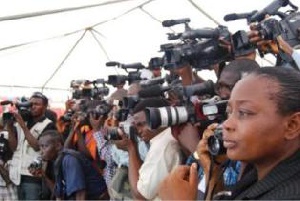An environmental training course on climate change reporting has opened in Berlin for selected journalists from all over the world, to sharpen their skills in climate reporting in their respective countries.
The Ecologic Institute in Berlin in partnership with the German Foreign Office is hosting 20 journalists from Ghana, Zambia, Botswana, Egypt, Tanzania, Uganda, Ethiopia, Namibia and Kenya as well as those from Russia, Indonesia, Brazil, South Korea, India, Jamaica, Philippines.
Mr Hinrich Tholken, Head of Division on Climate and Environmental Foreign Policy, Sustainable Economy of the German Federal Foreign Office in Berlin, said climate change threat was a global issue that should be dealt with, not only by environmentalists, but governments, and society at large.
He said because climate change issues were so complex and technical, journalists whose duty was to inform the public, had to be educated and that was why the German Foreign Office was collaborating with the Ecologic Institute to organise the training for them.
He said as part of efforts to address the phenomenon, the German Foreign Office also supported negotiations on national positions on climate change, and engaged in climate diplomacy.
He said the Federal Government also had a lot of programmes lined up to support governments on climate change mitigation and adaptation, "since climate change has a lot to do with international relations and foreign security.
"Climate change may harm security in the world, while fragile states might suffer more if nothing is done by all countries to mitigate the impacts of climate change," Mr Tholken stated.
He reminded the participating journalists that their countries had significant roles to play in the issues of climate change, and therefore, urged them to learn about the issues, and in turn speak to politicians, decision makers and all stakeholders to make the best decisions in adapting to climate change mitigation measures, as well as making informed decisions at the Paris Conference of Parties (COP 21) in December.
Mr Matthias Duwe, Head of Climate at the Ecologic Institute in Berlin, said because reporting on climate change was challenging, and journalists, like the general public, often wrestled with the highly intricate nature of both the sciences and the UN negotiation processes, the training would help address the challenge with the aim of improving climate change relevant media coverage in the lead up to Paris 2015.
He said policy makers and environmental groups worldwide were scrambling to prepare for the adoption of a new international climate agreement at the Paris 2015 climate summit in December.
"However, the very specific language of the UN negotiations and the technical complexity of climate science are not readily understood by the average citizen," he added.
The training includes instructive training workshops on a diverse array of topics such as: "The Science of Climate Change" and "UNFCCC: How does a COP work?
All the courses are designed to meet the professional needs of journalists and led by a team of experts in climate science and policy.
Participating journalists would also be able to attend and cover the high-level international meeting dubbed "Petersberg Climate Dialogue" in Berlin, where they will have the chance to meet and interview climate experts and Ministers of various countries during the Dialogue proceedings on May 17and 18.
Regional News of Thursday, 14 May 2015
Source: GNA

















